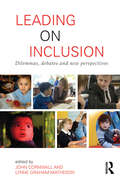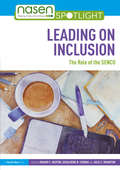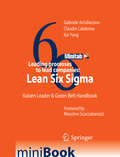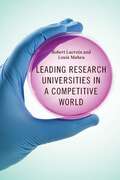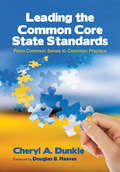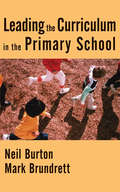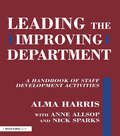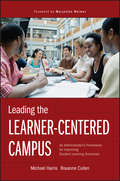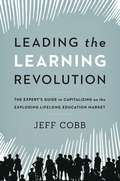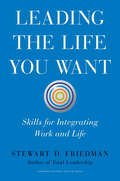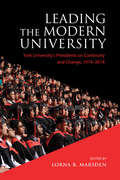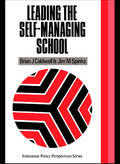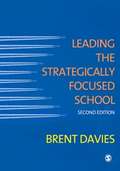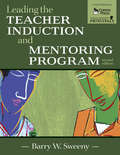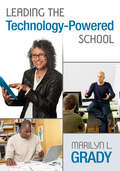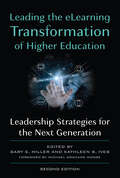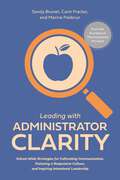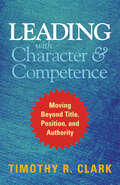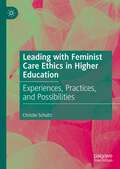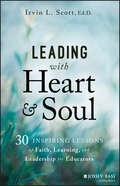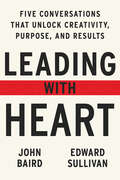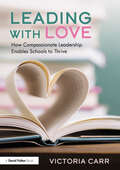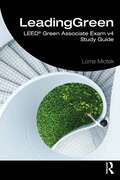- Table View
- List View
Leading on Inclusion: Dilemmas, debates and new perspectives
by Lynne Graham-Matheson John CornwallLeading on Inclusion: Dilemmas, debates and new perspectives critically examines the current theory and legislative context of special educational needs and disability, and explores the enduring issues and opportunities that will affect future practice in all schools. The central theme throughout the book asks the inevitable question ‘What happens next?’ and the expert team of contributors, drawn from a pool of teachers, academics and researchers, consider wide-ranging issues such as: the voice of young people whole school development and planning for inclusion educational change within the context of inclusion the pros and cons of multi-professional working inclusive and ethical research international perspectives on inclusion, SEN and disability the development of teacher education and the notion of ‘joined up’ thinking. This forward-thinking and rigorously researched book will be essential reading for students, teachers undertaking school-based training, SENCOs, inclusion managers, higher education tutors and anyone with a professional interest in the future for inclusive education.
Leading on Inclusion: The Role of the SENCO (nasen spotlight)
by Mhairi C. Beaton; Geraldene N. Codina; Julie C. WhartonThis comprehensive resource provides a range of perspectives on inclusion, giving Special Educational Needs Co-ordinators (SENCOs) the opportunity to consider the principles and practice that underpin their leadership role. Offering a blend of academic and professional knowledge, each chapter explores different aspects of the role of the SENCO and supports areas that will be considered as part of the National Award for SENCOs. A variety of essential topics are covered, from the importance of SEND provision and multi-disciplinary practice, to the role of the SENCO and leadership. Key features of this book include: Contributions by leaders of the National Award for Special Educational Needs Co-ordinators working with trainee SENCOs across the country A focus on encouraging SENCOs to think deeply about their own individual practice through engagement with cutting-edge research A flexible structure that can be read as a whole, or dipped in and out of as professional learning needs require This book provides an opportunity for readers to engage with a multiplicity of voices and approaches, allowing them to critically explore their role as leaders of SEND provision in schools. It is an invaluable resource both for students and those already within the role of Special Educational Needs Co-ordinator.
Leading processes to lead companies: Kaizen Leader & Green Belt Handbook
by Claudio Calabrese Gabriele Arcidiacono Kai YangThis Minibook is a brief guide for Green Belt during a Lean Six Sigma project management or for Kaizen Leader during a process improvement activity. Through both its theoretical concepts and practical examples it is a pocket book for a quick consultancy. Authors idea comes from companies needs in order to analyze information useful to know in depth different kind of processes. The set of Six Sigma tools are explained through Minitab 16, the last release of the most widely used statistical software.
Leading research universities in a competitive world
by Robert LacroixAlthough research universities represent only fifteen to twenty per cent of national university systems worldwide, they provide the bulk of fundamental research and doctoral training. Written by two veteran university administrators, Leading Research Universities in a Competitive World focuses on the international ranking systems’ uneven distribution of these institutions in industrialized countries, and the organizational factors affecting their efficacy, prestige, and performance. Robert Lacroix and Louis Maheu argue that research universities, despite being embedded within academia’s mindset and rules, have to master market influences and relationships in order to produce new knowledge and attract the rare talent and limited financial assets required for successful research and education activities. Comparing the configuration of higher education systems in the US, UK, France, and Canada, the authors outline the ways in which research universities, which need public funding and have to engage diverse forms of state regulation, may possess sufficient autonomy to behave as independent actors. They demonstrate that reaching an equilibrium between autonomy and state regulation, though challenging, is an essential element in the success of high performing research universities. Leading Research Universities in a Competitive World illuminates the operation of these institutions through substantive quantitative and qualitative datasets to address the fundamental question of why universities perform differently.
Leading the Common Core State Standards: From Common Sense to Common Practice
by Cheryl A. DunkleTransform your school using proven core curriculum practices This practical guide provides step-by-step guidance for overcoming the barriers to adopting the Common Core State Standards and achieving equity and excellence for all students. An experienced teacher and principal, Cheryl Dunkle shows leaders how to lead implementation of the CCSS and continuous quality improvement in schools. This practical guide addresses these key issues and more: Communicating the CCSS to teachers and parents and attaining their buy-in Transitioning schools and districts to align with the CCSS Determining which teaching and learning practices need to change Garnering resources and support for reforms Included are professional learning resources such as guiding questions, an annotated bibliography, and a list of helpful references.
Leading the Curriculum in the Primary School (Routledge Studies In The Modern World Economy #Vol. 45)
by Neil Burton Mark Brundrett'The book is a good introduction to anyone taking on middle leadership in the primary sector, and will be useful to heads and deputies who are considering how to organise their schools in the face continuing change and increasing accountability' - Times Educational Supplement In recent years, there has been an acknowledgement of the need for teachers to develop management and leadership skills in addition to specialized subject knowledge, to achieve a state where they possess transferable skills that can be employed in co-ordinating any area of the primary curriculum. This book will provide trainees, NQTs and experienced teachers with the management and leadership techniques that they will need in order to develop, with appropriate experience and opportunities, into subject leaders or effective members of a senior management team. The emphasis in this book is on the practical techniques and strategies of curriculum leadership. At all levels of experience, from establishing a direction through working with resources to leading and motivating colleagues, this book deals with the theoretical, practical and technological issues facing teachers as they create and manage curricula. This book is an invaluable resource for trainees and teachers at every level as they confront the rapidly shifting demands of their profession.
Leading the Improving Department: A Handbook of Staff Activities
by Alma Harris Anne Allsop Nick SparksDepartmental improvement is the key to whole school improvement. This book complements existing programs of professional development and training on both national and local levels. Heads of department and subject leaders in secondary schools will find this professional handbook essential for planning in-service training, improving the effectiveness of the department, and developing personal leadership abilities. This book combines well-founded professional development theory with practical suggestions. It has been written in an open and accessible way with photocopiable inset activities that have been tried and tested in training situations.
Leading the Learner-Centered Campus
by Michael Harris Maryellen Weimer Roxanne CullenThe Learner-Centered paradigm on campuses has grown into an institution-wide effort led by administrators at all levels, working to make their campuses into learner-centered environments. Stepping into that movement, this book shows campus leaders how to translate theory into practice. Outlining how the roles of academic leaders must change in a learner-centered academic environment, the authors explain the varied processes to be followed as all levels of administration transform practices from an instructional leadership mode to a learner-centered leadership mode. The book is a powerful tool for improving higher education for everyone from presidents to department chairs.
Leading the Learning Revolution: The Expert's Guide to Capitalizing on the Exploding Lifelong Education Market
by Jeff CobbLifelong learning has become a multibillion-dollar business, with more than 60 million adults currently engaged in webinars, webcasts, in-house training, continuing education classes, and more. But it is also an industry in flux, as newcomers topple old-guard organizations that cant keep pace with the need for instant access to materials and flexible delivery methods, as well as demands for community and connection. Leading the Learning Revolution is the first book to explain how to tap into this lucrative market, which rewards the most forward-thinking training firms, professional associations, continuing education programs, entrepreneurial speakers and consultants, and others. Filled with insights from the authors vast experience, field-tested strategies, interviews, and anecdotes, the book explains how to: Use technology to create high-impact learning opportunities Develop content that is faster and better than the competitions Convert prospects to customers by building connection Focus on the bottom-line results of lifelong learning Successful people and organizations never stop learning, and the people and organizations that lead that learning will never stop growing!
Leading the Life You Want
by Stewart D. Friedman"For nearly thirty years, my life's work has been to help people like you find ways to bring the often warring aspects of life into greater harmony." - Stew Friedman, from Leading the Life You WantYou're busy trying to lead a "full" life. But does it really feel full-or are you stretched too thin? Enter Stew Friedman, Wharton professor, adviser to leaders across the globe, and passionate advocate of replacing the misguided metaphor of "work/life balance" with something more realistic and sustainable. If you're seeking "balance" you'll never achieve it, argues Friedman. The idea that "work" competes with "life" ignores the more nuanced reality of our humanity-the interaction of four domains: work, home, community, and the private self. The goal is to create harmony among them instead of thinking only in terms of trade-offs. It can be done.Building on his national bestseller, Total Leadership, and on decades of research, teaching, and practice as both consultant and senior executive, Friedman identifies the critical skills for integrating work and the rest of life. He illustrates them through compelling original stories of these remarkable people: former Bain & Company CEO and Bridgespan co-founder Tom Tierney Facebook COO and bestselling author Sheryl Sandberg nonprofit leader and US Navy SEAL Eric Greitens US First Lady Michelle Obama soccer champion-turned-broadcaster Julie Foudy renowned artist Bruce SpringsteenEach of these admirable (though surely imperfect) people exemplifies a set of skills-for being real, being whole, and being innovative-that produce a sense of purpose, coherence, and optimism.Based on interviews and research, their stories paint a vivid picture of how six very different leaders use these skills to act with authenticity, integrity, and creativity-and they prove that significant public success is accomplished not at the expense of the rest of life, but as the result of meaningful engagement in all its parts. With dozens of practical exercises for strengthening these skills, curated from the latest research in organizational psychology and related fields, this book will inspire you, inform you, and instruct you on how to take realistic steps now toward leading the life you truly want.
Leading the Life You Want
by Stewart D. Friedman"For nearly thirty years, my life's work has been to help people like you find ways to bring the often warring aspects of life into greater harmony." - Stew Friedman, from Leading the Life You WantYou're busy trying to lead a "full" life. But does it really feel full-or are you stretched too thin? Enter Stew Friedman, Wharton professor, adviser to leaders across the globe, and passionate advocate of replacing the misguided metaphor of "work/life balance" with something more realistic and sustainable. If you're seeking "balance" you'll never achieve it, argues Friedman. The idea that "work" competes with "life" ignores the more nuanced reality of our humanity-the interaction of four domains: work, home, community, and the private self. The goal is to create harmony among them instead of thinking only in terms of trade-offs. It can be done.Building on his national bestseller, Total Leadership, and on decades of research, teaching, and practice as both consultant and senior executive, Friedman identifies the critical skills for integrating work and the rest of life. He illustrates them through compelling original stories of these remarkable people: former Bain & Company CEO and Bridgespan co-founder Tom Tierney Facebook COO and bestselling author Sheryl Sandberg nonprofit leader and US Navy SEAL Eric Greitens US First Lady Michelle Obama soccer champion-turned-broadcaster Julie Foudy renowned artist Bruce SpringsteenEach of these admirable (though surely imperfect) people exemplifies a set of skills-for being real, being whole, and being innovative-that produce a sense of purpose, coherence, and optimism.Based on interviews and research, their stories paint a vivid picture of how six very different leaders use these skills to act with authenticity, integrity, and creativity-and they prove that significant public success is accomplished not at the expense of the rest of life, but as the result of meaningful engagement in all its parts. With dozens of practical exercises for strengthening these skills, curated from the latest research in organizational psychology and related fields, this book will inspire you, inform you, and instruct you on how to take realistic steps now toward leading the life you truly want.
Leading the Life You Want: Skills for Integrating Work and Life
by Stewart D. Friedman"For nearly thirty years, my life's work has been to help people like you find ways to bring the often warring aspects of life into greater harmony. " - Stew Friedman, from Leading the Life You Want You're busy trying to lead a "full" life. But does it really feel full-or are you stretched too thin? Enter Stew Friedman, Wharton professor, adviser to leaders across the globe, and passionate advocate of replacing the misguided metaphor of "work/life balance" with something more realistic and sustainable. If you're seeking "balance" you'll never achieve it, argues Friedman. The idea that "work" competes with "life" ignores the more nuanced reality of our humanity-the interaction of four domains: work, home, community, and the private self. The goal is to create harmony among them instead of thinking only in terms of trade-offs. It can be done. Building on his national bestseller, Total Leadership, and on decades of research, teaching, and practice as both consultant and senior executive, Friedman identifies the critical skills for integrating work and the rest of life. He illustrates them through compelling original stories of these remarkable people: - former Bain & Company CEO and Bridgespan co-founder Tom Tierney - Facebook COO and bestselling author Sheryl Sandberg - nonprofit leader and US Navy SEAL Eric Greitens - US First Lady Michelle Obama - soccer champion-turned-broadcaster Julie Foudy - renowned artist Bruce Springsteen Each of these admirable (though surely imperfect) people exemplifies a set of skills-for being real, being whole, and being innovative-that produce a sense of purpose, coherence, and optimism. Based on interviews and research, their stories paint a vivid picture of how six very different leaders use these skills to act with authenticity, integrity, and creativity-and they prove that significant public success is accomplished not at the expense of the rest of life, but as the result of meaningful engagement in all its parts. With dozens of practical exercises for strengthening these skills, curated from the latest research in organizational psychology and related fields, this book will inspire you, inform you, and instruct you on how to take realistic steps now toward leading the life you truly want.
Leading the Modern University: York University’s Presidents on Continuity and Change, 1974-2014
by Lorna R. MarsdenFounded in 1959, York University is now the second largest university in Ontario and third largest university in Canada. However, starting in 1970s the success of the university was far from guaranteed.Leading the Modern University documents the challenges and solutions that five successive university presidents (H. Ian Macdonald, Harry Arthurs, Susan Mann, Lorna Marsden, and Mamdouh Shoukri) encountered from the very early 1970s up to 2014. This book is the rare occurrence where a series of university presidents describe and analyze the challenges they faced regarding financing, morale crises, and succession. With each president contributing a chapter, covering her or his own years in office, Leading the Modern University reveals that large public institutions have internal dynamics and external forces that supersede any individual leader's years in office. This is a case study for those interested in organizational change as seen by the leadership of a major public institution during a dynamic period in higher education.
Leading the Self-Managing School (Education Policy Perspectives Ser.)
by Brian J. Caldwell Jim M. SpinksThis work is a sequel to The Self-Managing School and deals with leadership responsibilities on two levels - as head of a school responsible for loca management and as a director in a Local Education Authority responsible
Leading the Strategically Focused School: Success and Sustainability
by Brent DaviesDrawing upon Brent Davies′s extensive experience in presenting nationally and internationally to school leaders, this book distils the collective wisdom from educationalists across the globe. Updated with new international examples and references and a significant new chapter on developing strategic talent in schools, the book has been described as a ′must read′ for existing and aspiring school leaders. The book focuses on: " establishing processes for building whole school involvement " strategic approaches to build capacity in your school " building and sustaining strategic leadership throughout the school " developing strategic talent in schools " characteristics of strategically focused schools This book is an indispensable read for school leaders who want to focus on bringing sustainable improvement to their school. Dr Brent Davies is Professor of Leadership Development at the University of Hull.
Leading the Teacher Induction and Mentoring Program
by Barry W. SweenyUse these step-by-step strategies to develop and implement a proven program that links to districtwide goals and results in highly qualified teachers and increased student achievement.
Leading the Technology-Powered School
by Marilyn L. Grady"A straightforward and easy read about what it takes to become a tech savvy leader in today′s educational setting."—Nathan Flansburg, PrincipalValentine Hills Elementary School, Arden Hills, MN"The topic is timely and this book is practical and relevant to K–12 schools across the country. The tables, checklists, rubrics, research-based models, and website recommendations are terrific."—Minjuan Wang, Associate Professor of Educational TechnologySan Diego State UniversityDon′t just ride the technology train – drive itToday′s children would rather text than talk, use apps instead of maps, and carry their phones, computers, cameras, and stereos in their palms. They need an active classroom, interdisciplinary curriculum, and project-based instruction that mirrors their lives outside the classroom. Author Marilyn L. Grady offers a cut-to-the-chase approach for busy principals who want to successfully lead with technology for enhanced student learning. This helpful resource shows school leaders how toDevelop a technology leadership teamImplement professional development Assess technical needs, student learning, and teacher performanceAddress cyber safety effectivelyIncluded are field-tested tools in digestible "bytes" that bridge theory and practice, including a Principal′s Exploration Agenda that outlines how to build capacity by taking just 15 minutes a day to explore recommended websites and blogs. Staying ahead of the technology curve is essential, and this book is written with an understanding that changes in technology are constant. The variety of principal experiences and vignettes will show you how to guide the way as your school′s chief instructional leader.
Leading the eLearning Transformation of Higher Education: Leadership Strategies for the Next Generation
by Gary E. Miller and Kathleen S. IvesPublished in Association with eLearning has entered the mainstream of higher education as an agent of strategic change. This transformation requires eLearning leaders to develop the skills to innovate successfully at a time of heightened competition and rapid technological change.In this environment eLearning leaders must act within their institutions as much more than technology managers and assume the prime role of helping their institutions understand the opportunities that eLearning presents for faculty, for students, and for client organizations in the community. They need to prepare to participate in policy development around these opportunities. They must understand the multiple dimensions of practice in the field—operations, administration, and working within the complex culture of a higher education institution—while also functioning as scholars of the field who can bring the best ideas from other institutions to help shape policy around eLearning.The second edition builds on the success of the first edition and presents both the collective expertise of veterans who have pioneered the field for 20 years, and of a rising generation of eLearning leaders that are transforming online programs at their own institutions, to address these challenges.This edition has been updated and expanded to reflect the increasing complexity of the field with seven new chapters and the revision of eight chapters that appeared in the first edition. New and updated topics include:·The evolving role of the chief online learning officer·Issues of diversity as more women and minorities enter leadership roles in the field·The increasing role of learning analytics and data-based decisions·The potential tensions involved in cohort-based versus individualized instruction·The increasing need for faculty professional development·The affordances of cloud computing, adaptive learning, artificial intelligence, the internet of things, and mobile learning to the field·The open educational resources movement and the implications for institutional policy and practice·The challenges of an increasingly complex competitive environment·AccessibilityThere are few comparable positions in higher education than that of eLearning leaders who work across multiple academic and support units and whose work fundamentally affects the institution as a whole. This volume is written for them.
Leading with Administrator Clarity: School-Wide Strategies for Cultivating Communication, Fostering a Responsive Culture, and Inspiring Intentional Leadership
by Marine Freibrun Carin Fractor Sandy BrunetLearn and grow as a more effective administrator and help shape student lives for the better with Leading with Administrator Clarity. This resource, made just for aspiring, new, and veteran school leaders, principals, superintendents, and even teacher leaders, will help you lead your school using intentionality as a key to create sustainable success and impact.Practicing administrative clarity, or the idea that transparent expectations lead to increased teacher and student achievement, has never been more accessible. In combination, the factors which make up Administrator Clarity can set the stage for a good staff to become great and a great staff to become unstoppable. Inside you'll find: - Research-based practices to assist in creating a culture that fosters student achievement - Personal anecdotes and stories from practicing school leaders - Hands-on, practical, and easily portable resources for school administrators in their daily work and life. - Details on the tools and competencies needed to be intentional and clear in order to cultivate communication, foster a responsive culture, and inspire teachers and teacher leaders Let Leading with Administrator Clarity guide you to learn and grow as an effective administrator and to increase your positive impact for all members of your campus community.
Leading with Character and Competence: Moving Beyond Title, Position, and Authority
by Timothy R. ClarkLeading with Character and CompetenceMoving beyond Title, Position, and Authority "Leadership is an applied discipline, not a foamy concept to muse about," says three-time CEO, Oxford-trained scholar, and consultant Timothy R. Clark. "In fact, it's the most important applied discipline in the world." The success of any organization can be traced directly to leadership. And leadership can be learned. But too many books and development programs focus exclusively on skills. In reality, performance and ultimate credibility are based on a combination of character and competence. As Clark puts it, character is the core and competence the crust. He shows how greatness emerges from a powerful combination of the two, although in the end character is more important. A leader with character but no competence will be ineffective, while a leader with competence but no character is dangerous.Clark spotlights the four most important components of character and competence and offers a series of eloquent, inspiring, and actionable reflections on what's needed to build each one. Fundamentally, he sees leadership as influence—leaders influence people "to climb, stretch, and become." You need character to influence positively and competence to influence effectively. This is a book for anyone, no matter where he or she is on the organization chart. Because today employees at all levels are being asked to step up, not only can everyone be a leader, everyone has to be. Clark's insights are profound, and his passion is infectious. "Leadership" he writes, "is the most engaging, inspiring, and deeply satisfying activity known to humankind. Through leadership we have the opportunity to progress, overcome adversity, change lives, and bless the race."
Leading with Feminist Care Ethics in Higher Education: Experiences, Practices, and Possibilities
by Christie SchultzThis book explores how academic leaders throughout higher education experience and practice care and the ethics of care. Drawing on a narrative inquiry study of experiences and practices of feminist care ethics in higher education leadership, Schultz counters academic norms, including expectations of competition and criticism across all activities, by uncovering the common experiences of academic leaders who intentionally adopt practices guided by an ethics of care and relationality. Within the context of institutions of higher education responding to present-day social movements, the book highlights how practices of care-centered leadership can enable change that begins on campus and reaches outwards to positively impact the community.
Leading with Heart and Soul: 30 Inspiring Lessons of Faith, Learning, and Leadership for Educators
by Irvin L. ScottA spiritually grounded source of inspiration and answers for education leaders in troubling times Public confidence in schools is waning, and there remains an unprecedented teacher shortage in the United States. Leading with Heart and Soul: 30 Inspiring Lessons of Faith, Learning, and Leadership for Educators shows leaders how to use spiritual principles to care for teachers, students, and other stakeholders despite these obstacles. Principals, superintendents, and others will gain motivation from the stories and strategies inside. Drawing on spiritual principles and Dr. Irvin Scott's experience as a classroom, school, district, and non-profit leader, this book will reinvigorate you and your team as you try to answer your most pressing questions about the future of education, including: How do we empower innovative, servant-hearted educational leaders to meet the needs of students? How do we inspire whole communities to support the learning journeys of their youth? How do we engage the entire educational ecosystem—including nonprofits and other organizations—to uplift equitable opportunities to learning and ensure that every student has the resources needed to thrive? This is not a time for leaders to turn away from our children, their caregivers, and the educators who teach and nurture them. Instead, it is a time to lift them up and celebrate the work they do while navigating our own administrative mandates and challenges. Leading with Heart and Soul speaks directly to the individuals in a position to achieve that goal. It is perfect for book clubs; personal study; and within public, Christian private, and faith-based charter schools.
Leading with Heart: 5 Conversations That Unlock Creativity, Purpose, and Results
by John Baird Edward SullivanTwo veteran executive coaches help today's leaders learn how to retain and inspire their teams through the one thing their research has found works: Leading with Heart. In these pages, leadership coaches John Baird and Edward Sullivan share hundreds of hours of research and firsthand accounts of guiding leaders at some of the world's most respected big brands and small startups (Apple, Nike, Google, and Slack to name a few). Through their coaching and research they uncovered the five behaviors transformative leaders engage in to connect authentically with their teams: They are aware of their people's needs. They help their people to confront the fears that hold them back.They understand their own desires and what drives their people. They leverage their unique gifts and help people find their own. They connect with their core sense of purpose and help people find theirs. The key to achieving these behaviors is asking the right questions and having conversations that connect you and your employees on the deepest human level—conversations the authors coach you on how to navigate.At a time when workplaces are struggling to build high morale and connected cultures, Leading with Heart will help leaders to unlock the best version of themselves and those around them with transformative results.No matter where you are in your career, this book is your launch point to leading with heart. By encouraging you to ignore outdated “leadership hacks” and embrace introspection and growth, Leading with Heart guides you to ask the right questions and find your own answers. Now you too can create a leadership game-plan that is authentic to you and brings out the best in those around you.
Leading with Love: How Compassionate Leadership Enables Schools to Thrive
by Victoria CarrLeading with Love reveals how focusing on relationships, wellbeing and core moral and ethical values can transform the motivation and engagement of teachers, parents and pupils, increasing their overall happiness as well as academic standards. In each chapter Victoria Carr presents accessible and relatable personal life lessons, leadership observations and anecdotes, drawing on her leadership experiences in a wide range of schools to show how leading with integrity is possible for all. Her methods are simple and authentic and have transformed failing schools into thriving ones, improving whole-school systems, the culture of staff and pupil wellbeing and mental health, and standards. Full of practical tips and end of chapter summaries with further suggested reading, Leading with Love will appeal to anyone who has suffered from imposter syndrome, who thinks they are not good enough to succeed, who thinks they are too old or don’t have the right background. With a Foreword from Paul Garvey, this is essential reading for all school leaders and aspiring school leaders.
LeadingGreen: LEED® Green Associate Exam v4 Study Guide
by Lorne MlotekLeadingGreen: LEED® Green Associate Exam v4 Study Guide brings together a concise introduction to the core concepts behind the LEED green building rating system with efficient, effective test preparation for the LEED® Green Associate Exam. The guide provides an essential foundation in principles of sustainable design and construction for students and professionals in the areas of architecture, engineering, construction, real estate development, urban planning, and environmental policy. If you are interested in passing the LEED® Green Associate Exam, this is the right place to start. The background, objectives, and evolution of green building standards – as well as what actually goes into a LEED building – are covered in a clear and straightforward manner. Tailored to precise exam expectations, the guide breaks down the key LEED categories one credit at a time. Drawing upon the author’s extensive experience as a LEED educator for universities and professional firms around the world, the guide includes proven tips and tricks that have helped over 10,000 people pass the Green Associate Exam. An ideal resource for self-study, LeadingGreen: LEED® Green Associate Exam v4 Study Guide will benefit readers from all built environment professions in which LEED credentials are an asset.
